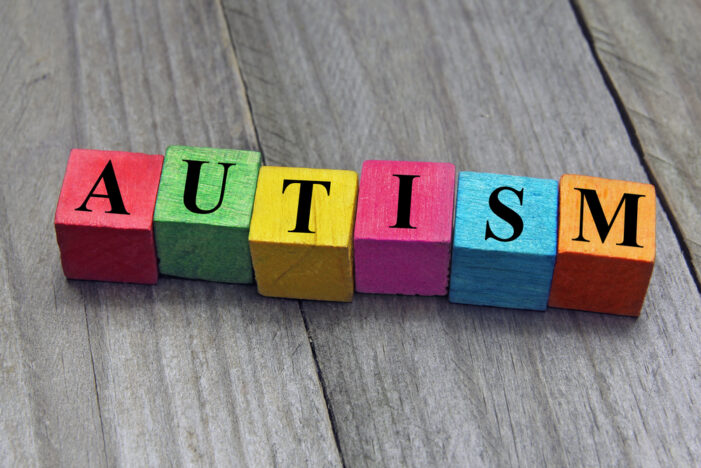By Linda Nwoke
Alexa is a bright and imaginative seven-year-old girl living in her creative world. A world that includes her and shuts most people out, characterized by complex social interactions even with her immediate family members. Alexa finds it challenging to make friends and does not understand social cues, like facial expressions and body language, that say someone is happy, sad, or mad. She remains oblivious to it all.
Unlike other girls her age, she likes to follow a routine, and you will also notice some repetitive behaviors like repeating phrases and pushing the buttons on her clothes. Disrupting her routine often makes her confused and scared, resulting in distressed behavior like throwing a tantrum. This serves as a form of expressing or communicating her emotional state.
Hence, adhering to a structured routine and schedule gives her solace and causes her to be calm. The need for consistency and predictability makes her feel secure and comforted in an otherwise confusing and unpredictable world.
She gets easily overwhelmed by loud noises and bright lights, leading to sensory overload and making it difficult for her to focus. Whenever she feels overwhelmed, she flaps her hands and twirls as a form of expression since she is non-verbal compared to other children her age.
Alexa’s heightened sensory sensitivity and other behaviors described led to her being diagnosed as a person with autism spectrum disorder (ASD). A condition is known for its differences in social interaction, communication, and repetitive behaviors.
Despite Alexa’s challenges, she has an incredible memory and the ability to recall information with precision and remarkable accuracy. She also likes specific topics, such as nature and animals, which she could spend hours exploring, which makes her a fascinating person.
Prevalence of Autism Spectrum Disorder
Autism Spectrum disorder (ASD) is a neurodevelopmental condition affecting the individual’s neurological and developmental composition. According to a CDC report (2020), it is found in one out of every thirty-four children in the United States.
It affects at least four times more boys than girls. According to the ADDM network, New Jersey consistently reports the highest prevalence rates of autism. In contrast, Arkansas has the least number of children with autism, at one in every seventy-seven children in the state. Regardless of ethnic, racial, and socioeconomic groups, the disorder can be found among all groups.
Parental Responsibilities and Support
After the diagnosis, Alexa’s parents, Mark and Emily, understood that their role as parents was crucial in supporting Alexa’s unique needs and helping her thrive. However, they had to understand and manage themselves to keep her accordingly, especially their own emotions.
They learned that being the parent to a child with autism had unique challenges, especially in seeking help on behalf of their child, specifically advocating for her rights and accessing appropriate resources. However, they encountered numerous challenges, including long waiting lists for therapies and evaluations, navigating a complex education system, and unraveling insurance complexities like what insurance covers and what they must pay out of pocket.
Moreover, Alexa’s parents realized that early intervention was crucial for their daughter to learn the necessary skills to survive. So, they actively sought professional support for her speech impairment from a speech therapist to enhance her communication skills. They sought occupational therapy to help her manage sensory sensitivities, and they participated in parenting workshops and educational sessions to learn strategies for creating an organized and supportive environment at home.
As they navigated the new territory, a crucial part of those workshops included learning to manage their varying emotions, such as worry, guilt, and frustration. Another thing they knew was the importance of nurturing their need for self-care to enhance their well-being.
Thus, joining support groups where they can connect with other parents facing similar challenges was the right move. In these groups, they learn, share, and exchange experiences and advice, which helps them manage the pressure of caring for a child with special needs.
Creating a Supportive Environment
Generally, one’s living environment plays a significant role in recovering from illness. In Alexa’s case, creating a nurturing environment is paramount to her becoming self-sustaining later in life; this includes a combination of effort at home, school, social interactions, and community.
At home, family members must be educated about her condition, its effect on them, and their role in supporting her; this can be accomplished through open communication within the family about autism and fostering an environment of acceptance, love, and patience.
Some of the value derived from creating a supportive environment includes fostering emotional and psychological well-being for individuals with autism, reducing their anxiety and stress caused by heightened sensitivity to sensory stimuli and environmental changes, and promoting the use of effective communication strategies that limit misunderstandings and frustrations, thereby increasing their ability to interact and socialize.
Others include providing individualized support and accommodations that help them learn and participate and promoting inclusive social interactions that foster meaningful relationships. Ultimately, they can develop essential life skills that enable individuals with autism to achieve independence and self-sufficiency, which can help them live a meaningful and fulfilling life.
Best Models for Working Together
Based on various associations with other parents and professionals, Alexa’s parents, Mark and Emily, understood that they must promote their child’s need for autonomy and self-advocacy. Thus, they encourage her to express her preferences and make choices, helping her develop her individuality. Developing these skills will enable Alexa to become more self-sufficient and less dependent in some areas.
To accomplish this milestone, they worked collaboratively with respective professionals, therapists, and educators to develop the appropriate Individualized Education Program (IEP) through arranged meetings, where they could share their knowledge and insights on their daughter’s strengths and challenges. Based on this, Alexa received tailored support and accommodations to thrive academically and socially.
At home, they continually celebrated every milestone and success she accomplished, including at school performances, focusing on her abilities and successes rather than limitations, which will help her build self-confidence and resilience.
Rights of Autistic Children
Generally, every child’s right is a human right. However, for a child living with autism, acknowledging, respecting, and protecting their rights is expedient to enable them to reach their potential and ensure they have equal opportunities to thrive in society.
Notably, they have a right to be accepted and respected for who they are by creating an inclusive and non-judgmental environment that celebrates their uniqueness and promotes a sense of belonging and self-worth.
Furthermore, they have a right to accessible and inclusive education in schools that can provide appropriate support services, accommodations, and individualized educational plans to meet their unique needs.
They must also be encouraged to express themselves through alternative forms of communication such as assistive technology, sign language, or pictures. They must have the necessary tools and support to understand, effectively express themselves, and engage in meaningful conversations.
Autistic children also have a right to access healthcare services that promote their well-being, such as early intervention, regular check-ups, therapies, and mental health support for their needs.
They must also be allowed through their rights to make decisions that affect their lives, where possible, through recognizing their choices and preferences. This right supports developing independence and self-advocacy skills that empower them to become autonomous where possible.
Other rights that must be noted include protection from discrimination, especially in healthcare, education, and employment. Also, have the right to social inclusion, which allows them to fully contribute and participate in society, including social events, inclusive recreational activities, and competitions that accommodate their needs and interests.
The deliberate act of promoting acceptance and understanding in the community reduces stigmatization and potential alienation. Overall, children with autism have a right to receive support and advocacy that will enable them to navigate various aspects of their lives.
All hands, including parents, educators, professionals, and caregivers, must be on deck, working collaboratively to provide services, guidance, and resources that foster their development and quality of life.

